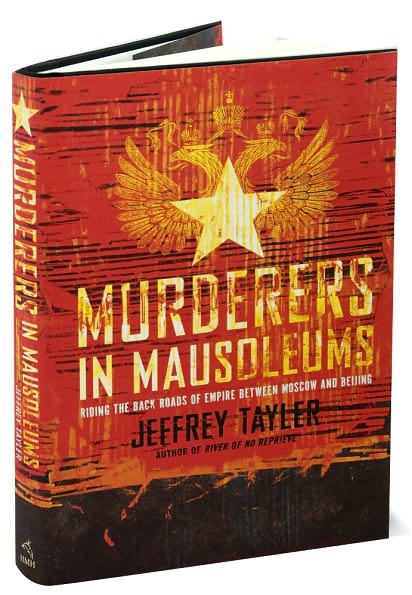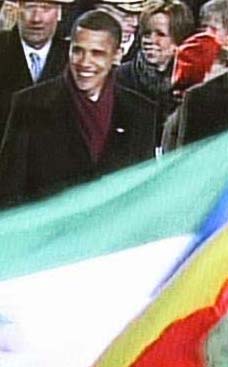
In his latest book, Murderers in Mausoleums: Riding the Back Roads of Empire Between Moscow and Beijing, Tayler tours the Russian and Chinese spheres of influence to see which way the winds of change are blowing almost two decades after the end of the Cold War. His 7,200-mile, three-month journey takes him through the unraveling ethnic quilt of the Caucuses, through an increasingly authoritarian Central Asia and to the outer limits of China, where the ragged edges of history are being smoothed over by a newfound prosperity. But the central question behind Tayler’s journey is an essentially American one. After watching former Soviet republics and even Russia itself flirt with Western-style reforms and democracy through much of the 1990s, only to see many of those gains reversed, do we still have a chance? “Is the West, across the strategically vital expanses of Russia and Central Asia,” asks Tayler, “set to lose the new Great Game?” Jeffrey Tayler served as a Peace Corps Volunteer in Morocco. He has published numerous articles in Atlantic Monthly, Spin, Harper's and Condé Nast Traveler and is a regular commentator on NPR's "All Things Considered.
Jeffrey Tayler's latest book is a masterful guide to the divisions that define so much of human civilization
‘Murderers in Mausoleums’: What Counts Is Your Blood
Travel Books: Jeffrey Tayler's latest book is a masterful guide to the divisions that define so much of human civilization. Jason Daley explains.
01.26.09 | 11:00 AM ET
Jeffrey Tayler, Murderers in Mausoleums
My grandfather is buried in an Irish cemetery. Actually, the cemetery isn’t exclusively Irish, but the corner where the first generation of my immigrant family lies might as well be—like an abstract map of Europe, to the south lies a cluster of Italians, the English are close by and to the southeast a row of slumping sandstone crosses marks the resting place of German nuns, a stark waypoint that reminds me when to turn right during visits.
As a young child, I thought the ethnic division of the graveyard was hysterically absurd. My little Catholic school class was an ancestry grab bag—among my 30 or so classmates there were living descendants from every surname in that graveyard, plus children of Jewish, African-American and even Iranian ancestry. I tried to imagine the sorts of violent insults during my grandfather’s time that could have divided the neighbors of my little Midwestern city so absolutely that they’d decided to pass eternity segregated from everyone except blood. Even now, it’s hard to imagine a time when the fact that my ancestors came from Cork, or Swaziland, or Lithuania could make much difference.
I’m not alone in my bewilderment. For many Americans, especially Boomers and beyond, ethnicity has become nothing more than a party trick (race, on the other hand ... well we’re still working on that). During a lull in the chit-chat some dull conversationalist is bound to ask a pretty girl, “So, Wysocki. Is that Polish?” Which sets off a round of geographic spin-the-bottle before the host turns up the music. But in large swaths of the world, ethnicity is still the better part of destiny. The bank of the river you plow, the side your great grandfather took during the war, and the style of dumplings you eat are still integral parts of personal identity and politics and are often a matter of life and death.
Which is why, for Americans, understanding the world on its own terms takes a little hand-holding. Veteran foreign correspondent (and World Hum contributor) Jeffrey Tayler is a masterful guide to the divisions and rivalries that define so much of human civilization. In his latest book, Murderers in Mausoleums: Riding the Back Roads of Empire Between Moscow and Beijing, Tayler tours the Russian and Chinese spheres of influence to see which way the winds of change are blowing almost two decades after the end of the Cold War. His 7,200-mile, three-month journey takes him through the unraveling ethnic quilt of the Caucuses, through an increasingly authoritarian Central Asia and to the outer limits of China, where the ragged edges of history are being smoothed over by a newfound prosperity. But the central question behind Tayler’s journey is an essentially American one. After watching former Soviet republics and even Russia itself flirt with Western-style reforms and democracy through much of the 1990s, only to see many of those gains reversed, do we still have a chance? “Is the West, across the strategically vital expanses of Russia and Central Asia,” asks Tayler, “set to lose the new Great Game?”
Eschewing politicians and policy wonks, Tayler, who has been living in Moscow for the last decade, takes his question to the masses, traveling by train and taxi, collecting opinions from the, often, hard-drinking locals he comes across. Tayler’s writing is often stunningly beautiful, and he has a knack for finding interesting, and generous, friends. But a straight answer to his question isn’t easily forthcoming. In the Russian Caucuses, centuries-old rivalries kept in check by the Communists are flaring up in Chechnya and Dagestan, while racial tensions between ethnic Russians and Caucasians are leading to open violence. “One spark and Russia will explode and disintegrate along ethnic lines. There will be chaos here,” explains a Cossack filmmaker in the early days of Tayler’s trip.
Democracy and human rights aren’t even up for discussion. In Karbardino-Balkaria, a small Muslim Russian Republic, Tayler finds contradictions everywhere—men calling for religious uprisings while saving money to buy Infinitis. It’s a place where the democracy of the Yeltsin years is seen as a nationwide scam that brought nothing but a flowering of strip clubs while Putin’s strong-man power grabs are hailed as stabilizing influences.
The independent nations of Central Asia are less angry (and drunk) it seems, and even a bit hopeful, emboldened by a recent oil boom. Tayler finds an emerging Kazakhstan where the locals don’t mind an authoritarian capitalist dictator as long as malls and oceanariums open in the centrally planned capital city of Astana. But he also finds a nation with its nose still pointed squarely at Russia. In a country where a woman was sent to a prison camp for saying German sewing machines were better than Soviet machines and where a generation of children were dosed with radiation from nuclear tests, Kazakhstan, as well as Kyrgyzstan, maintain a doe-eyed loyalty to the Russians who pulled them out of tribalism, educated them, set up heavy industry and drew them, at least during Soviet days, into the larger world. That’s the type of bond even the best American diplomat would have a hard time cracking.
Tayler’s final leg takes him to the outlands of China, to Urumqi, one of the world’s largest inland ports and the capital of the Uighur Autonomous Area. There he finds a vitality and order that is missing in the Russian sphere. Even more, he finds in the nominally Communist country some of the reformist spark that had gone out in Soviet realms. “The West, now so unpopular in Russia, still evokes longing and enthusiasm in China,” he remarks, and finds that manifest at Chu Dong, a nightclub where he spends several nights drinking wine and Sprite while sussing out the Western-style dreams of the club’s 20-somethings.
Is Tayler’s final analysis—that “The new Great Game that began with the collapse of the Soviet Union has ended, and victory has gone to the home teams”—correct? If the opinions of Kazakh taxi drivers, Chinese club kids and nostalgic Russians count, he’s on the money. But whether or not Tayler has solved the Central Asian puzzle doesn’t matter. He’s bottled what’s in the air, taken the pulse of an entire region and glimpsed the aspirations of its inhabitants, a more difficult task than predicting politics. If all foreign policy could be presented this well, world affairs would quickly become our national pastime.
In the end, Tayler’s unspoken conclusion is that America’s failure, or inevitable failure, to sway Central Asia to our side has to do with a fundamental mismatch between our homegrown idealism and a complex world order that has existed for centuries—ethnic bonds that strip clubs and democracy just can’t sever. “What counts, or what should count, is not blood but upbringing, education, and shared ideals,” Tayler argues to a Cossack nationalist in the city of Novocherkassk, Russia. “We’ve passed out of the tribal age, at least I hope, haven’t we?”
But the ataman, or chief, cuts to the heart of the matter. “I’ve told you, being American means nothing at all. What counts is your blood. If you don’t understand that, you don’t understand anything.” And there the problem lies.













